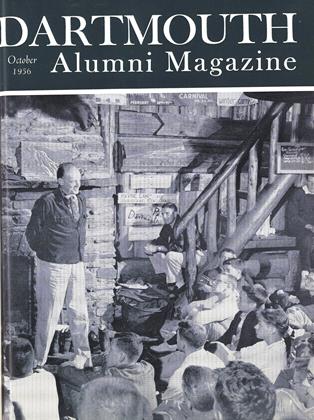FOR about quarter of a century College construction has been at a relative standstill, with few notable additions to the plant and with little more local racket than that of the motorized leaf raker-and-chewer-uppers that ply the campus. This past summer has, however, been replete with repairing, re-routing, and refurbishing — an earnest, perhaps, of the decade to come. It has been a mad rush to get the house picked up before the cleaning lady arrives.
One of the not wholly minor, and certainly one of the more astounding, Lazarine operations of the summer has been the de-mothballing of South Hall as domicile for a portion of this year's unexpected spate of undergraduates. Old South, possibly so-called because William Faulkner must have drawn many of his less endearing characters from among its earlier denizens, now stands resplendent in gleaming white paint and, according to the Bursar's pronouncement, "within view of the campus."
Hanover's first South Hall was the "lower hotel property" on the site of the Tavern Block, purchased by the College in 1868 at a cost of 13500, and used as a dormitory chiefly by Agricultural School students until they were afforded the luxury of Conant — later Hallgarten — Hall some five years thereafter. But fortunately it burned down in 1888 (the year after the big Main Street fire) and the insurance money helped build Bartlett. Our present South Hall, over on the corner of Lebanon and College, started its career in 1840, when the Methodist Society "bought a lot and built a church." Ten years later the Methodists sold it to the Episcopalians and they, in turn, disposed of it to one George Kibling, who put it to more secular use as an Opera House with a commodious stage, 15 feet deep, and an auditorium to seat 600.The Dartmouth, in October 1879, recorded that "the frescoing in particular is worthy of notice," and that "at last the town has a public hall fit to hold such entertainments as do not properly belong in the church." "Comical Brown" appeared at Kibling's in 1881 before a disappointing house, but two years later, "Comus and Terpsichore reigned until the wee small hours" at the May Ball.
During the ensuing twenty years, Kibling's, or The Commercial House, served as a boarding establishment, skating rink, tenement, bowling alley, and hotel. In 1925 the College, faced with a Malthusian population problem, fitted the structure out as a dormitory and re-christened it "South Hall." One occupant of that era describes its interior as reminiscent of an old Boston & Maine coach but, he adds, "I believe we became better acquainted than the men in the plush establishments. A ruckus on one floor resounded through the vibrating walls of the entire building and, whether by reason of inquisitiveness or protest, a convivial assembly promptly formed."
This was a short-lived utilization of an ancient and occasionally honorable property, but now, once again, an overpopulous College is forced to recall the lower floors of the building into temporary emergency service. Not, however, before an almost superhuman job of restoration has been accomplished in complete plastering, painting, piping and wiring, with a new shower for each 5.6 occupants. A lounge room has been fitted up and, although the ceilings are but 7' o" high and the clientele is therefore limited to no greater than JV basketball players, the walls of both rooms and corridors are enlivened with the College's now familiar assortment of gayly astonishing tones. Once again "the frescoing in particular is worthy of notice."
South Hall is not South Mass or even South Fayer, but it compares very favorably with lots of dorms in lots of colleges. And it may well foster in its present incarnation, as it has in the past, an esprit de corps, a private club attitude even in a Chas. Addams setting, that has been a characteristic of the inmates of such dorms as old Sanborn, Crosby, Reed, or Hellgate: a noble company who have all, in their time, "sighed deep, laughed free, starved, feasted, despaired — been happy."
 View Full Issue
View Full Issue
More From This Issue
-
 Feature
FeatureBusiness as a Social Service
October 1956 By THE HON. RALPH E. FLANDERS, LL.D. '51, U.S. SENATOR FROM VERMONT -
 Feature
FeatureIndustry Galls On the Liberal Arts
October 1956 -
 Feature
FeatureHE DUG DEEP TOO
October 1956 -
 Feature
Feature1960: Big, Bright, Lots of Them
October 1956 -
 Feature
Feature"Dartmouth Visited"
October 1956 By ROBERT L. ALLEN '45 -
 Class Notes
Class Notes1918
October 1956 By ERNEST H. EARLEY, W. CURTIS GLOVER, RICHARD P. WHITE
BILL McCARTER 19
Article
-
 Article
ArticleTHE PRESIDENT'S ENGAGEMENTS
-
 Article
ArticleR. M. LEACH '02 CANDIDATE FOR LIEUTENANT-GOVERNOR OF MASS.
FEBRUARY, 1928 -
 Article
ArticlePresident Hopkins Elector
November 1928 -
 Article
ArticleWinter Trips
APRIL 1932 -
 Article
ArticleDo You Know Us?
MARCH 1989 -
 Article
ArticleI Give and Bequeath to the Trustees of Dartmouth College...
February 1947 By STANLEY B. JONES '18


